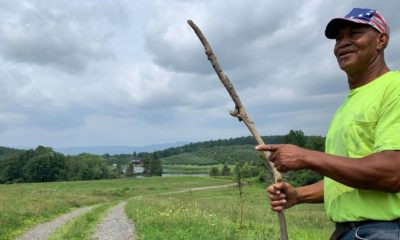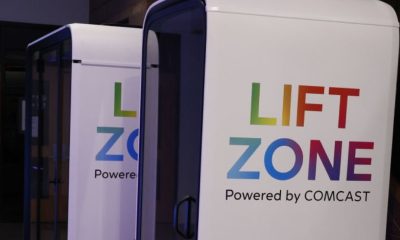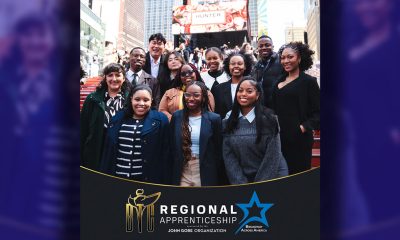Business
Men’s Self-Care in Baltimore
THE AFRO — Randy Lewis can’t say for certain when the new trend of men’s self-care took off, but he’s loving being in front of it.
By J. K. Schmid
Randy Lewis can’t say for certain when the new trend of men’s self-care took off, but he’s loving being in front of it.
“I always took care of myself, always groomed myself,” Lewis told the AFRO. “I saw that a lot of men weren’t. Did they think that men just don’t take of themselves, they just throw shirts on and go out the door?”
A part of Lewis’s self-care is his thick full beard. It stands out and it seems completely free of strays, patches and split ends. He’s been growing it for 12 years.
Lewis attributes the uptick in the rise in the prominence of beards as fashionable to the Facebook page Beard Game Matters.
“It started to spread when they got like millions of followers,” Lewis said. “And I think that’s how beards became really popular in the last couple of years.”
All the while, in pursuit of perfection, Lewis tried any number of off-the-shelf consumer beard care products.
“My beard was still sketchy,” Lewis said. “ It was still growing in, but it wasn’t healthy: A lot of breakage, I had a patch here and there; so I started researching.”
A week on Google, looking for natural and quality solutions led Lewis-literally-to right in his backyard.
“I was like, ‘wow,’ so I’m growing stuff right in my garden that I can use and basically infuse it with the natural oils to create beard products. That’s what I did. I did it for like four months, where I test different recipes that I came up with.”
One successful test saved Lewis’s family a lot of pain and cash.
“My nephew suffers from extreme eczema, and the doctors wanted to put him on steroids and it was costing my sister a lot of money. And then I went back to computer: researched what herbs, what natural oils works for eczema. I created this butter just for him, and then I added it to the company. He’s been using it for two years.”
“My sister made me cry,” Lewis said. “She made a post on Facebook and she was saying how I created this for [Lewis’s nephew] and his skin went from that to this and that’s thanks to his uncle and not the doctor’s who were trying to stick him.”
Lewis works out of his home in Edison, where he provides on-site care: steam baths, brush ups and sales, he also says he has a strong mail-order demand as well, shipping as far away as California.
The space is cozy, and Lewis’s care for plants dominates the environment. The next week’s harvest of basil, mint and rosemary are right up front for customers to inspect alongside bottles of oil infusing for Lewis next creations.
There’s a boutique aspect in that old recipes are only available upon request. During the AFRO’s visit, Lewis was working on a new coconut lime butter.
As the business expands, Lewis is catering to more and more women. He’s developed a new hair oil with eucalyptus and rosemary, and as Valentine’s Day approaches, he selling not only to men shopping for themselves, but women shopping for the men in their life.
Before Father’s Day, in April and May, Lewis will be relocating downtown, near Lombard and MLK and he hopes to wind up with a one-stop-shop for every kind of men’s self care.
“I basically want to turn it into like a GQ/men’s spa type of thing,” Lewis said. “Have my steamer going where you can get your beard treated right on the spot. I want a barber in there, maybe two, where you can physically get hair cuts.The whole nine yards, maybe get an outdoor space where you can sit back and have a cigar. There’s a lot of women’s spots out here. We don’t have a lot of things for men. I’m trying to build something for us.”
Appointments can be made at FIVEOCLOCKCO on Facebook and Instagram.
This article originally appeared in The Afro.
Alameda County
Seth Curry Makes Impressive Debut with the Golden State Warriors
Seth looked comfortable in his new uniform, seamlessly fitting into the Warriors’ offensive and defensive system. He finished the night with an impressive 14 points, becoming one of the team’s top scorers for the game. Seth’s points came in a variety of ways – floaters, spot-up three-pointers, mid-range jumpers, and a handful of aggressive drives that kept the Oklahoma City Thunder defense on its heels.

By Y’Anad Burrell
Tuesday night was anything but ordinary for fans in San Francisco as Seth Curry made his highly anticipated debut as a new member of the Golden State Warriors. Seth didn’t disappoint, delivering a performance that not only showcased his scoring ability but also demonstrated his added value to the team.
At 35, the 12-year NBA veteran on Monday signed a contract to play with the Warriors for the rest of the season.
Seth looked comfortable in his new uniform, seamlessly fitting into the Warriors’ offensive and defensive system. He finished the night with an impressive 14 points, becoming one of the team’s top scorers for the game. Seth’s points came in a variety of ways – floaters, spot-up three-pointers, mid-range jumpers, and a handful of aggressive drives that kept the Oklahoma City Thunder defense on its heels.
One of the most memorable moments of the evening came before Seth even scored his first points. As he checked into the game, the Chase Center erupted into applause, with fans rising to their feet to give the newest Warrior a standing ovation.
The crowd’s reaction was a testament not only to Seth’s reputation as a sharpshooter but also to the excitement he brings to the Warriors. It was clear that fans quickly embraced Seth as one of their own, eager to see what he could bring to the team’s championship aspirations.
Warriors’ superstar Steph Curry – Seth’s brother – did not play due to an injury. One could only imagine what it would be like if the Curry brothers were on the court together. Magic in the making.
Seth’s debut proved to be a turning point for the Warriors. Not only did he contribute on the scoreboard, but he also brought a sense of confidence and composure to the floor.
While their loss last night, OKC 124 – GSW 112, Seth’s impact was a game-changer and there’s more yet to come. Beyond statistics, it was clear that Seth’s presence elevated the team’s performance, giving the Warriors a new force as they look to make a deep playoff run.
Activism
Oakland Post: Week of November 26 – December 2, 2025
The printed Weekly Edition of the Oakland Post: Week of November 26 – December 2, 2025

To enlarge your view of this issue, use the slider, magnifying glass icon or full page icon in the lower right corner of the browser window.
Activism
Oakland Post: Week of November 19 – 25, 2025
The printed Weekly Edition of the Oakland Post: Week of November 19 – 25, 2025

To enlarge your view of this issue, use the slider, magnifying glass icon or full page icon in the lower right corner of the browser window.
-

 Activism3 weeks ago
Activism3 weeks agoOakland Post: Week of November 12 – 18, 2025
-

 Activism3 weeks ago
Activism3 weeks agoIN MEMORIAM: William ‘Bill’ Patterson, 94
-

 Activism3 weeks ago
Activism3 weeks agoHow Charles R. Drew University Navigated More Than $20 Million in Fed Cuts – Still Prioritizing Students and Community Health
-

 Bay Area3 weeks ago
Bay Area3 weeks agoNo Justice in the Justice System
-

 #NNPA BlackPress3 weeks ago
#NNPA BlackPress3 weeks agoLewis Hamilton set to start LAST in Saturday Night’s Las Vegas Grand Prix
-

 #NNPA BlackPress3 weeks ago
#NNPA BlackPress3 weeks agoThe Perfumed Hand of Hypocrisy: Trump Hosted Former Terror Suspect While America Condemns a Muslim Mayor
-

 #NNPA BlackPress2 weeks ago
#NNPA BlackPress2 weeks agoBeyoncé and Jay-Z make rare public appearance with Lewis Hamilton at Las Vegas Grand Prix
-

 #NNPA BlackPress3 weeks ago
#NNPA BlackPress3 weeks agoTrump’s Death Threat Rhetoric Sends Nation into Crisis


























































1 Comment